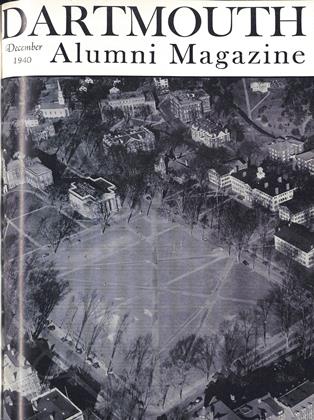By Theodore Geisel '25. Random House, 1940. p. 56.$1.50.
DESPITE SUPERFICIAL SIMILARITIES, the differerences between Henrik Ibsen and Theophrastus Seuss are systematic and basic. The fact that both are symbolists should not lead us into the easy supposition that there is any connection between their respective uses of symbolism as a literary armature. Nor should the fact that both are absurd on the surface insulate us against a realization that, whereas Dr. Seuss's absurdity stops short a few millimeters below the cortex, the absurdity of Ibsen goes right through to the core.
We who essay criticism should have the courage of our blind spots as well as the faith of our highlights; and I may as well admit that this comparison has been drawn between a fairly recent experience of The Wild Duck on the Hanover stage, and a quite recent reading of Horton Hatches the Egg. The two works, about equally funny, have drawn me into this disquisition on comparative symbolism because Ibsen's variety of symbol centers directly behind my critical, opaque eight ball, but Seuss's basks in the blissful, clear glare of the fluorescent lamp. Since early youth, I have been aggravated by an assumption on the part of my professorial betters that symbolism is something you can understand but cannot explain. They have said,
"Look! Wild Duck," and I have looked and asked, "So what?" and got nothing for my earnest curiosity but glances of profound pity. With Seuss it is wonderfully different. HortonHatches the Egg is a symbolic parable for our times, and the symbolism is as clear as day. The faithful elephant who sits on the egg of the faithless lazy bird has nothing whatever to do with Wendell Willkie. It is a staggering argument, rather, for holding firm to one's faith in first principles, in spite of the devil. It is, among other things, a parable against appeasement. Its crisis comes when Horton, faced by the rifles of the hunters (Munich for Horton) makes his great decision and goes right on sitting on that egg. And in the end, to confound pragmatic biology with transcendental morality, what hatches is not another little lazy bird at all. What hatches is—but read it for yourself, and remember that the way to attain the little winged pachyderm of happiness on earth is to stick to your principles, no matter who else is sticking to his guns.
 View Full Issue
View Full Issue
More From This Issue
-
 Article
ArticleLike Father, Like Son
December 1940 By PETER STIRLING CARDOZO '39 -
 Article
ArticleAmerican Student Morale
December 1940 -
 Article
ArticleThe Undergraduate Chair
December 1940 By Charles Bolte '41 -
 Class Notes
Class Notes1917*
December 1940 By EUGENE D. TOWLER, DONALD BROOKS -
 Article
ArticleGreen Eleven Makes Gridiron History
December 1940 -
 Class Notes
Class Notes1935*
December 1940 By JOHN D. GILCHRIST JR., BOBB CHANEY
Alexander Laing '25
-
 Books
BooksTHE FIVE HUNDRED HATS OF BARTHOLOMEW CUBBINS
January 1939 By Alexander Laing '25 -
 Article
ArticleWILLIAM JEWETT TUCKER
November 1943 By ALEXANDER LAING '25 -
 Books
BooksA MIRROR FOR AMERICANS. LIFE AND MANNERS IN THE UNITED STATES 1790-1870 AS RECORDED BY AMERICAN TRAVELERS.
January 1953 By ALEXANDER LAING '25 -
 Books
BooksUNDERCLIFF. Poems 1946-1953.
May 1954 By ALEXANDER LAING '25 -
 Article
ArticleNick Jacobson '35, Playwright
APRIL 1968 By ALEXANDER LAING '25 -
 Books
BooksROBERT SALMON: PAINTER OF SHIP & SHORE.
DECEMBER 1971 By ALEXANDER LAING '25
Books
-
 Books
BooksShelflife
Nov/Dec 2008 -
 Books
BooksTHE GIRLS WE LEAVE BEHIND.
JANUARY 1964 By ADDISON L. WINSHIP II '42 -
 Books
BooksLIBRARY EXTENSION UNDER THE WPA AN APPRAISAL OF AN EXPERIMENT IN FEDERAL AID
October 1944 By Fred S. Harold -
 Books
BooksCOPS OR CORPSES,
November 1948 By Herbert F. West '22. -
 Books
BooksTHE MYTHMAKERS: AN ESSAY ON POWER AND WEALTH.
JULY 1964 By MARTIN SEGAL -
 Books
BooksTHE CULTS OF ARICIA.
February 1935 By Wm. Stuart Messer
Alexander Laing '25
-
 Books
BooksTHE FIVE HUNDRED HATS OF BARTHOLOMEW CUBBINS
January 1939 By Alexander Laing '25 -
 Article
ArticleWILLIAM JEWETT TUCKER
November 1943 By ALEXANDER LAING '25 -
 Books
BooksA MIRROR FOR AMERICANS. LIFE AND MANNERS IN THE UNITED STATES 1790-1870 AS RECORDED BY AMERICAN TRAVELERS.
January 1953 By ALEXANDER LAING '25

